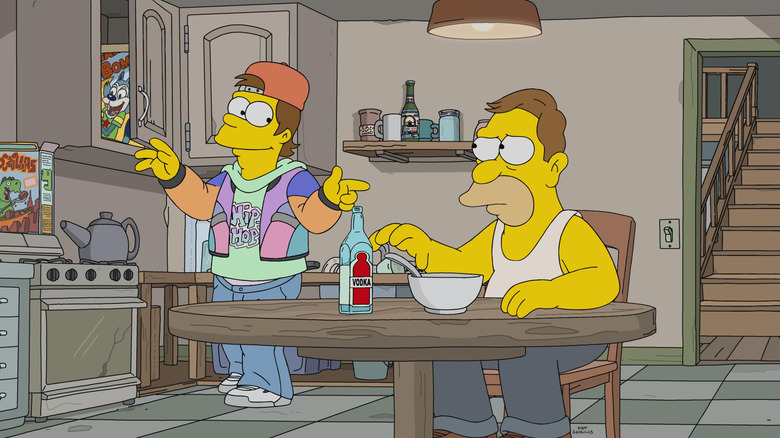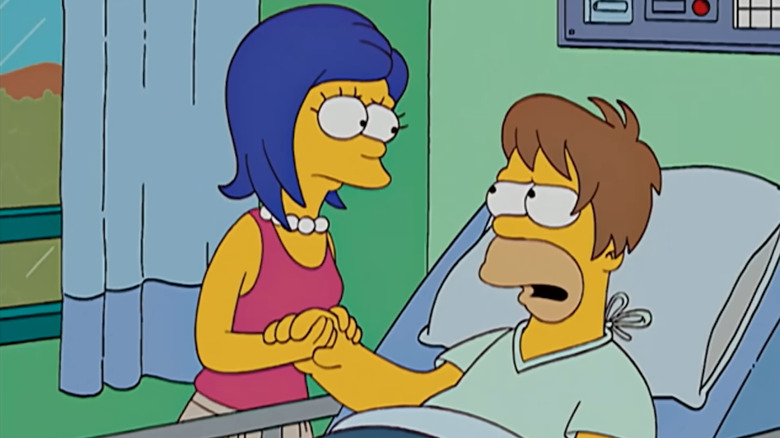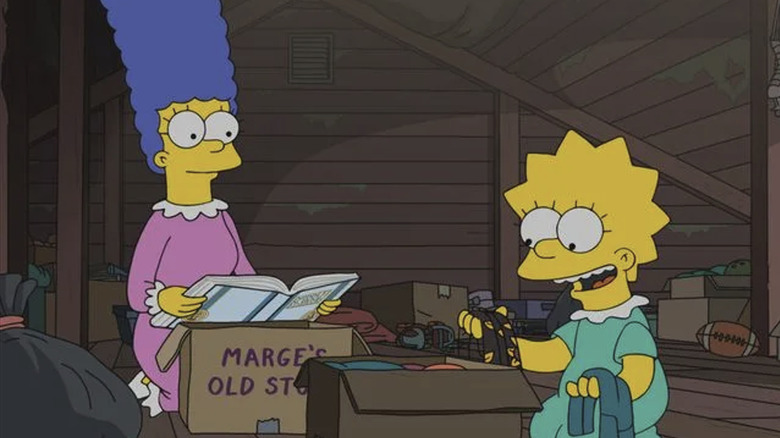The Simpsons Boss Has A Message For Fans Upset That Homer And Marge Are Now Millennials
It's hard to talk about "The Simpsons" these days without having an existential crisis over the age of the characters. If Bart had aged normally, he'd be 46 right now. Homer should be deep into his 70s, and even Maggie should be a fully-grown 37-year old. Even the news of a second "Simpsons" movie coming out in 2027, which should've been a wholly happy affair, came with the sobering reminder that we are now further away from the first movie than the first movie was from the show's 1989 premiere. Time keeps on slipping and we're all going to die one day, though rest assured Lisa will still be 8 years old when that day comes.
The result of the characters' immortality is that the show has to work with a floating timeline rather than the realistic timeline a live-action sitcom would operate under. Because the characters must stay the same age, their birth years must continually be updated. This leads to some storylines in later seasons that horrify fans of only classic-era "Simpsons," like the season 32 episode "Do Pizza Bots Dream of Electric Guitars?" which featured a flashback of Homer as a '90s teen. The recent season 37 premiere doubled down on this approach with a storyline where Lisa cashes in on '90s nostalgia by wearing the old clothes of Marge, who was a '90s kid. That's right: Homer and Marge are millennials now, not baby boomers.
Showrunner Matt Selman defended this approach in a recent Entertainment Weekly interview, telling fans, "I don't give an eff. The options are: we don't do flashback shows ever and we don't mention the past ever, which creatively handcuffs us, or we are playful and silly, which is the DNA of the show, and we have fun with whatever generation the show is airing in."
The floating timeline is the only option that makes sense
Selman continued, "If the show only took place in the present with a kind of vague 1970s-high-school Homer-and-Marge backstory that seems increasingly impossible — that would be much worse for telling good stories."
The updated flashbacks were something the show started early on. As "Simpsons" scholar TheRealJims pointed out, the show was already subtly changing the characters' birth years throughout the classic era, but the updates were minor and the show wasn't calling attention to them. In the show's teen seasons, the show quietly avoided flashback episodes seemingly because it was getting awkward; the gap between where the characters should've grown up, compared to when they would've grown up in the series premiere, was now too large to ignore.
It was only with "That '90s Show," that very divisive 2008 episode that created a whole new backstory for Homer and Marge, that the show fully embraced the floating timeline. Fans were annoyed at the time but the show stuck to its guns, and the more time goes by the more fans begrudgingly agree this was the right call. After all, what was the alternative? To stick to the '70s origin story would severely hinder the show creatively. As Selman argued:
"Part of telling stories is people remembering things from their youth, their childhood. Everyone's childhood is directly responsible for how they behave as an adult. You can't ignore childhood if you're going to be a storyteller. So we're not ignoring childhood. It would've been interesting as an experiment to just lock into the '70s and have them be like, 'Well, Lisa, when I was a kid in the '70s...' and then just have it all be about the '70s, even though we live in the f—ing post-apocalyptic future now."
Previous Simpsons flashback episodes are still canon
"I would also like to point out that in no way are we saying that the beloved other flashbacks didn't happen," Selman added. "We're not saying that. None of it happened! It's just a silly little show! So I like it all. Everything happened and didn't happen with the same level of historical veracity."
You could view these changes as the writers disrespecting the characters, but honestly I think it only strengthens them. The fact that Homer and Marge always get together no matter what the time period, no matter what new circumstances the writers throw at them, only further emphasizes that they really are soulmates. They've had a dozen different origin stories at this point and every single one of them ends with marriage; maybe that's frustrating from a continuity perspective, but it's also undeniably romantic.
Selman noted that the people who complain about the floating timeline are a small minority of the viewers; odds are, the people driving the outrage cycle aren't even the ones watching the show weekly anymore. The angry headlines about Homer and Marge being millennials are largely spread around by the same people who were angry about the "Homer's stopped strangling Bart" headlines from 2023, which were based around a throwaway line in season 35 that was not meant to be taken seriously. (Rest easy, child-abuse fans: Homer would strangle Bart again a mere two episodes later.) For the fans who still watch weekly, the updated flashbacks are something they've long since made peace with.
"It's a f—ing paradox. People suck it up anyway," Selman said. "Our show is still very popular in both America and internationally. I am not worried about messing with the timeline. I feel like story and character should come first, and the cinematic universe rules of a show that has none should come in a distant second."


